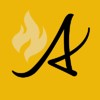
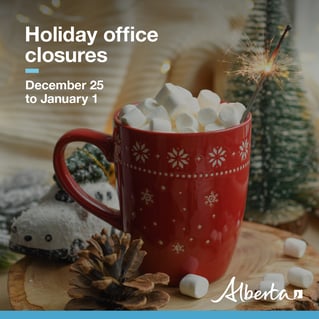
Wishing you a safe and wonderful holiday on behalf of Alberta Wildfire! Even during the holidays, firefighters are ready to respond to wildfires. If you spot a wildfire report it by calling 310-FIRE (3473).
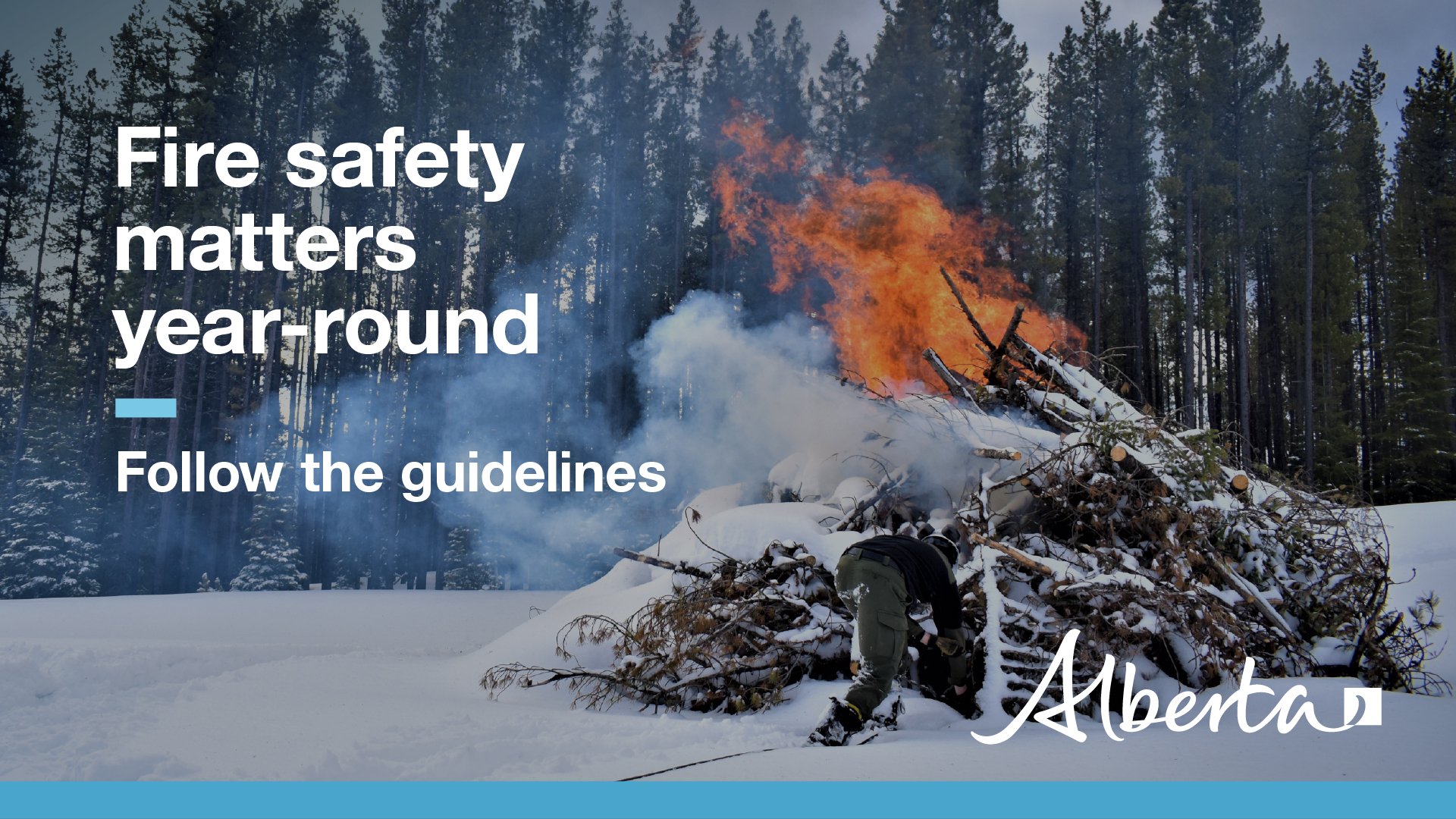
Firefighters continue to recommend delaying winter burning until there's a minimum of 15 centimeters of snow on the ground. Under the current conditions of low snow coverage and above-zero temperatures, there is a risk of unintended fire spread. Your cooperation to prevent wildfires is greatly appreciated.
Winter Burning
From November 1st to February 28th fire permits are not required for burning in the Forest Protection Area of Alberta. Even though a fire permit is not required, you are still responsible for any fires you ignite outside of the wildfire season. Click here to learn how to safely burn brush, vegetation or woody debris on your property.
Before You Burn:
-
Winter burns should be conducted in areas with sufficient snow cover of more than 15 centimetres and burns must be monitored the entire time.
-
Ensure smoke warning signs are in place before burning within half a mile (800 m) from a roadway. For more information on smoke management and to acquire signs, contact your local municipality. If you are outside of a municipality, contact Alberta Transportation.
-
Read over the Recommended Practices for placement and instruction of a “Smoke Ahead” sign.
While burning:
-
Have someone monitoring the burn the entire time – if it escapes, immediately report it to 310-FIRE (3473).
-
Only burn what you can control with the equipment and people you have available, and adjust your burning according to weather conditions.
-
Build it right. Brush piles or debris windrows should be free of soil, built to a maximum height of 3 metres, and with a fireguard or cleared land around it to stop the spread of fire.
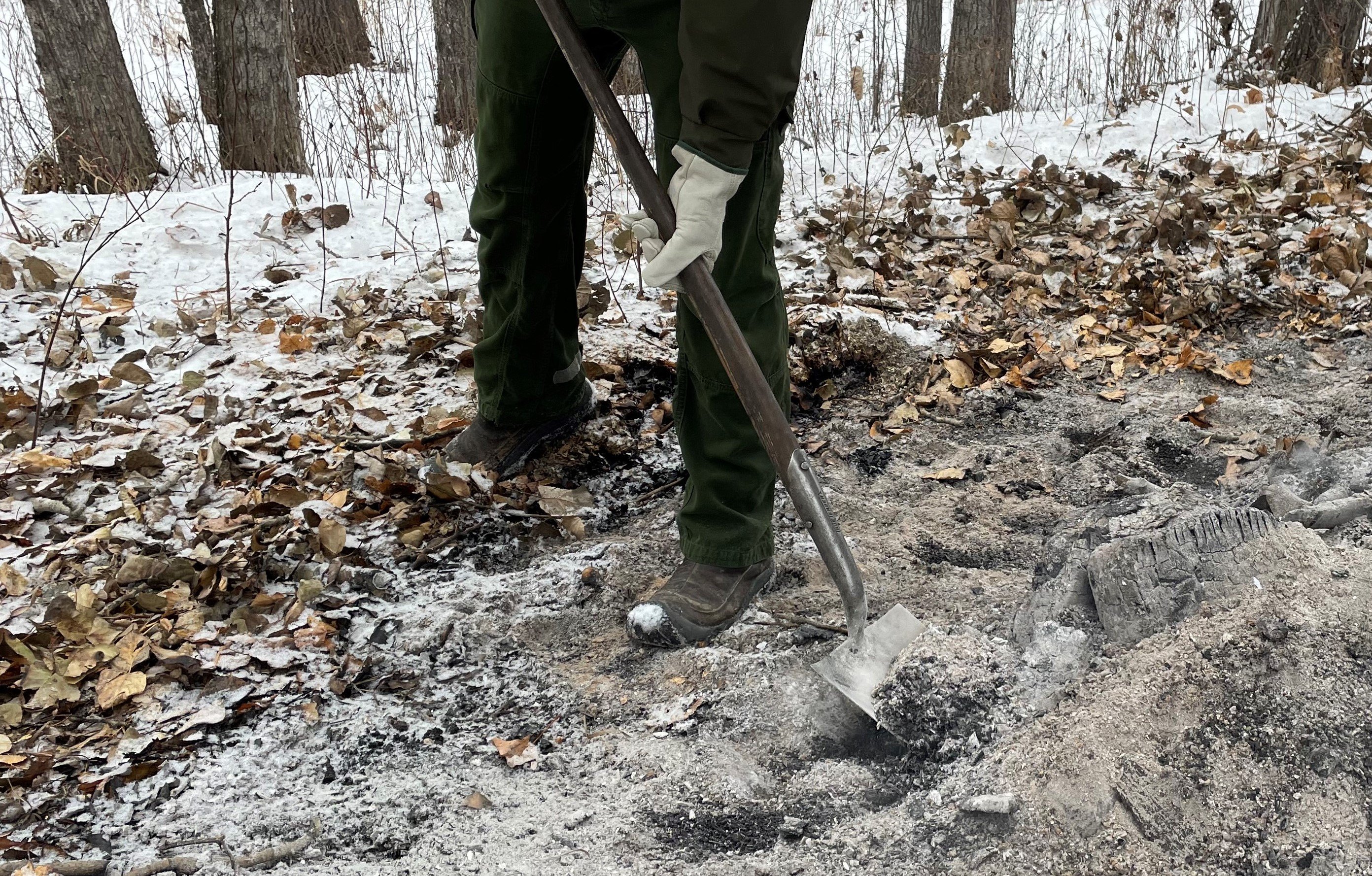
Due to extremely dry conditions in the ground, holdover fires are likely to occur. A fire lit in the winter and left smouldering will dig in and burn deep in the ground, under the snow all winter long. Under the right conditions, these fires can re-emerge in the spring as wildfires.To prevent spring wildfires, make sure to check your winter burn sites frequently and ensure that all fires are completely extinguished.
After you burn:
-
Spread remaining material within the pile and soak with water as required.
-
Check the area and ensure both heat and smoke are no longer being produced by the pile – it should be cool to the touch.
-
Check your burn site multiple times in the following weeks to ensure it has not reignited.
Smoke Safety
While winter is a safer time for burning due to reduced wildfire danger, it's still essential to take necessary precautions, such as monitoring the weather to prevent smoke from adversely affecting surrounding areas.
On particularly cold winter days, inversions and other weather factors can cause smoke from a winter burn to stay close to the ground and travel great distances. An inversion happens when cold air is trapped near the ground by a layer of warmer air above it. Inversions can cause dangerous driving conditions and impact nearby communities.
When burning in winter:
-
Refrain from burning when an inversion is in place or is forecasted.
-
Consult local municipalities and authorities on how to mitigate impacts when undertaking larger winter burning projects near communities or road ways.
-
Actively manage burn projects to reduce disposal time and smoke impacts.
-
Burning debris in stages will allow you to adapt to changing weather conditions and reduce smoke.
-
Monitor weather conditions: lower temperatures and lighter wind speeds can result in stronger inversions. The ideal conditions for burning are typically days with average temperatures and wind speeds over 5 km/h.
Since January 1, 2023, in the Forest Protection Area of Alberta, there have been 1,129 wildfires which burned 2,211,632.59 hectares. Of the 1,129 wildfires, 15 are being held, 50 are under control, 3 have been turned over and 1,061 have been extinguished.
To view wildfires on a map, download the AB Wildfire App or visit the Alberta Wildfire Status Dashboard
NOTE: The wildfire perimeter is an estimate based on measurements such as GPS, aerial scanning and satellite imagery. This estimated perimeter can change as more accurate measurements become available. Areas within the fire perimeter may not have been affected by wildfire.
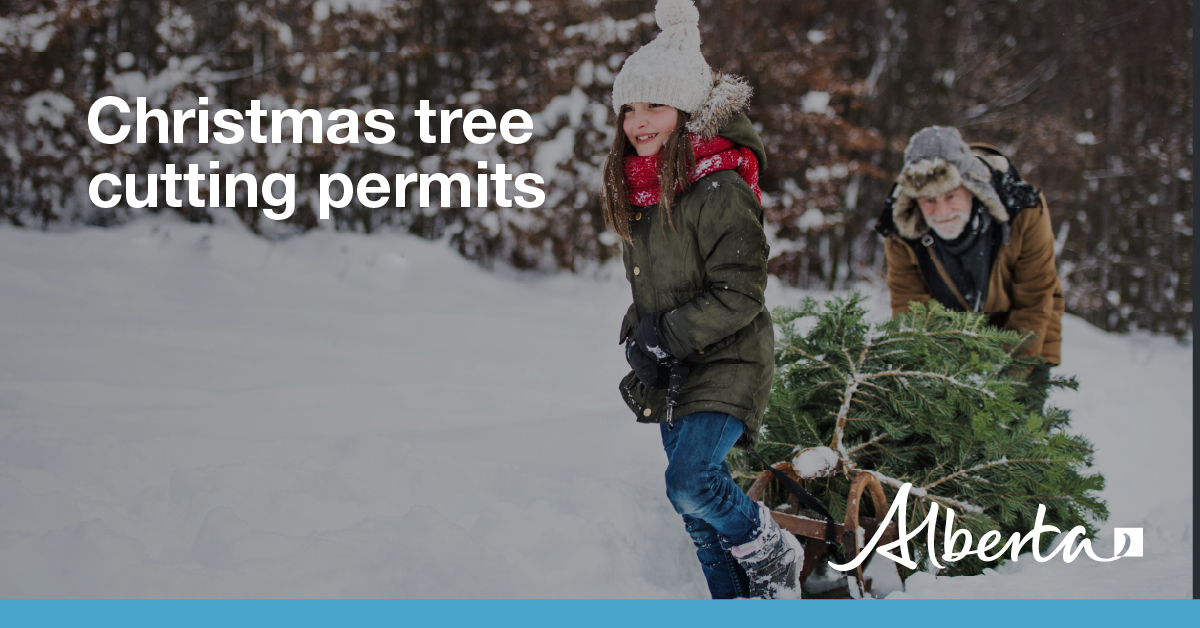
Christmas Tree Cutting Permit
It is the time of year when Albertans hunt for the perfect tree to backdrop holiday celebrations. To cut your own Christmas tree from Alberta’s public forests, you will require a Personal Use Forest Products Permit, or PUFPP. The PUFPP allows you to harvest up to three Christmas trees from designated areas on Crown land. There is no cost to get a PUFPP and you can easily obtain it online.
Your PUFPP only allows harvesting in designated areas. Even within these designated areas, there are some sites that are off-limits. They include within 30 metres of a stream or river, and within 100 metres of a lake. You cannot harvest a Christmas tree from facilities such as roadside turnouts, viewpoints, recreation areas or campgrounds.
Harvesting Christmas trees in Alberta provincial parks and recreation areas is strictly prohibited and carries a large fine. The only exception is designated areas in Cypress Hills Provincial Park and the Castle parks with a valid permit from Alberta Parks.
Remember:
- Each tree you harvest must be less than 2.5 metres tall, or about eight feet.
- You will need to have a digital or printed copy of your permit with you at all times when harvesting and transporting your Christmas trees (accessing email may not be possible).
- This permit is strictly for personal use, with no re-sale allowed.
- Do not cut the tops of trees that are taller than 2.5 metres to use as your tree.
If you’re planning to head out to harvest your own tree, be sure to obtain your permit early; you may require technical assistance or have other questions. Lastly, be safe! Let someone know when you are heading out, where you plan to cut, and what time you plan to be back. Cell service can be unreliable in the forest, and the snow can be much deeper than at home. Road conditions are variable; take extra winter clothing and emergency supplies.
For more information or to obtain a Personal Use Forest Products Permit (PUFPP) to cut your own Christmas tree, visit alberta.ca/tree-cutting.aspx.
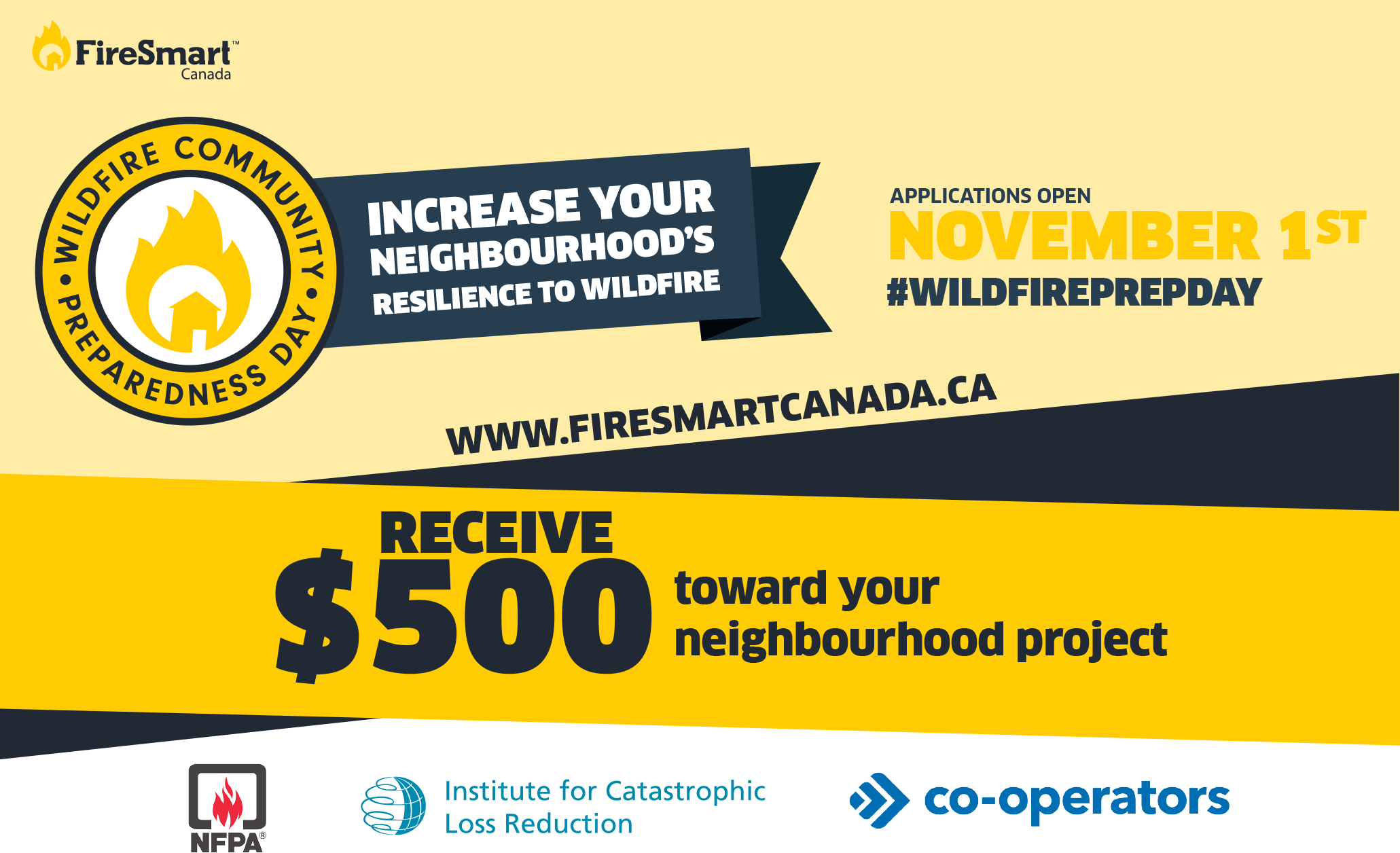
FireSmart
The wildfire dashboard provides up-to-date wildfire information at the click of a button. This interactive tool displays important statistics on the number of active wildfires in the province, sizes, locations, suspected causes and more. The dashboard builds on the former wildfire status map by displaying the most frequently accessed information in one convenient location.
Download the Alberta Wildfire app and get access to accurate, real-time information on wildfires in your area. You can also find information on fire advisories, restrictions and bans across the province and much more all on your mobile device. Available for Apple and Android.
Subscribe to the Slave Lake Forest Area Wildfire Update to receive an email when new information is posted.
Join the conversation on Facebook, Twitter or Instagram.If you have any questions, please contact:
Leah Lovequist
Wildfire Information Officer
Mobile:780-849-0945
Leah.Lovequist@gov.ab.ca
RELATED INFORMATION
Websites:
